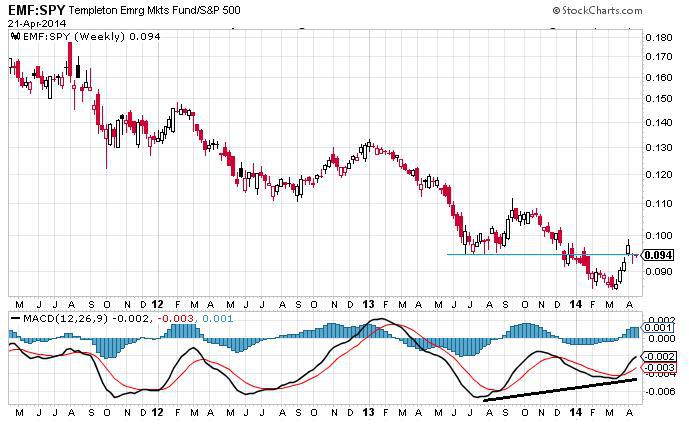Emerging Markets’ investing v Developed Markets
Stock-Markets / Emerging Markets Apr 22, 2014 - 12:23 PM GMTBy: Jonathan_Davis
 When we talk of Emerging Markets (EMs) we mean the likes of Brazil, Russia, India, China etc (AKA The BRICs).
When we talk of Emerging Markets (EMs) we mean the likes of Brazil, Russia, India, China etc (AKA The BRICs).
The Developed Markets (DMs) are the Anglo Saxon countries and Japan, Germany, France etc.
Over the last 6-9 months there has been relentless negative publicity, in the media, about BRICs. Article after article in the press, commentary after commentary on radio, piece after piece on TV saying the same thing: “Steer clear of EMs. They will lose you vast amounts of money. Get out and never come back.”
The thing is, EMs had lost quite a lot from their stock markets from 2011 to 2013 and into early 2014. In £ Sterling terms the indices fell some 25%.
So, the media was right then?
Not quite. The media made their big announcements mainly AFTER the falls in the stock markets. (Wouldn’t it have been helpful to ordinary investors/pension savers if they had sent out that message BEFORE the falls…? They rarely do. Remember all the media hype re residential Real Estate to 2007? And again now. What about the Gold hype from 2011?) The negative messages came since last Summer. Yet, it was last Summer that those stock markets appeared to be slowing down their descents.
The below chart shows the level of EM shares index relative to that of the US S&P 500 index.

As you can see the fall was slowing down in the second half of last year into March.
At this juncture, with the recent sharp relative (and nominal) rise in EM share prices – with the world getting over the Russian invasion shock as well as realising that Brazil is not Venezuela or Argentina – Socialist basket cases (pray for the people) – etc, the relative share prices are back to where they were last Summer – just as the Western media was telling all and sundry to get out of EM shares and into DM shares such as the S&P or the UK FTSE.
We have been wondering out loud why it was appropriate to invest (in recent months) in shares which have risen for the last 5 years (DMs) and sell out of markets which have crashed (EMs).
At this point we are not even saying EMs will rise and DMs will fall in price. We are saying, what is more likely is either they both go up or they both go down. In either of these instances, we would not be surprised to see EMs outperform DMs – simply because they very significantly underperformed for the last 2-3 years. Also, investors’ risk – if investing in both – is minimised, given one of them had already crashed.
It is not for us to say this or that will happen. All we have been doing was highlighting the very material price difference – one had soared and the other had crashed and yet the consensus was buy the former and sell the latter.
Our aim is to buy quality assets which have crashed or even collapsed in price and look as if they are reversing up.
By Jonathan Davis
http://jonathandaviswm.wordpress.com/
25+ year veteran of the world of financial services, the last 10 doing the same thing under his own name. We work with families all over the UK and in Switzerland and, indeed, on 2 other continents. If interested in our Wealth Management work, cast a glance at the firm’s website.
From time to time media folk call me and ask me to rant live or in the press. JD in the media.
I don’t buy hype. I don’t believe it’s the end of the world but I do believe, within a generation, the West will have no welfare state. The maths don’t lie. We’re toast. It’s obvious if you think about it.
© 2014 Copyright Jonathan Davis - All Rights Reserved
Disclaimer: The above is a matter of opinion provided for general information purposes only and is not intended as investment advice. Information and analysis above are derived from sources and utilising methods believed to be reliable, but we cannot accept responsibility for any losses you may incur as a result of this analysis. Individuals should consult with their personal financial advisors.
© 2005-2022 http://www.MarketOracle.co.uk - The Market Oracle is a FREE Daily Financial Markets Analysis & Forecasting online publication.



